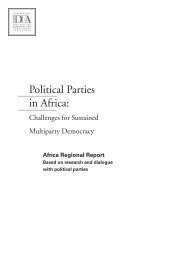Seminar Report The role of Political Parties in Democratic Transitions
Seminar Report The role of Political Parties in Democratic Transitions
Seminar Report The role of Political Parties in Democratic Transitions
Create successful ePaper yourself
Turn your PDF publications into a flip-book with our unique Google optimized e-Paper software.
- Partnership: Partnership means a spirit <strong>of</strong> mutual respect, co-operation and jo<strong>in</strong>t determ<strong>in</strong>ation <strong>of</strong><br />
plans and priority issues. For DIPD and NIMD the parliamentary political parties are their ma<strong>in</strong><br />
partners <strong>in</strong> Myanmar, but they will also engage with parties outside <strong>of</strong> parliament and build<br />
cooperation with civil society organization etc.<br />
- Local ownership: Local ownership <strong>of</strong> these processes and programmes means that the local<br />
partners have control over this process through prioritiz<strong>in</strong>g the issues and activities that they wish to<br />
tackle – they set the agenda.<br />
- Long-term: DIPD and NIMD seek to commit their respective organisations to work<strong>in</strong>g <strong>in</strong> Myanmar<br />
on a long term basis know<strong>in</strong>g that democratization is a long term process<br />
Overall, DIPD and NIMD believe that partnership is about ideas chang<strong>in</strong>g m<strong>in</strong>ds and not money chang<strong>in</strong>g<br />
hands. <strong>The</strong>y can <strong>of</strong>fer <strong>in</strong>spiration and acknowledge that democracy grows from with<strong>in</strong>.<br />
Pillars <strong>of</strong> the programme: To develop the Myanmar Multiparty Democracy Programme, DIPD and<br />
NIMD have had very positive consultations <strong>in</strong> the form <strong>of</strong> roundtable discussions with political<br />
networks, civil society organisations and <strong>in</strong>dividual meet<strong>in</strong>gs confirmed broad-based support for and<br />
appreciation <strong>of</strong> the proposed three-pronged approach for the Myanmar Multiparty Democracy<br />
Programme, focus<strong>in</strong>g on:<br />
- Facilitat<strong>in</strong>g an <strong>in</strong>clusive and impartial multiparty dialogue platform that addresses issues <strong>of</strong> national<br />
concern.<br />
- Strengthen<strong>in</strong>g the capacities <strong>of</strong> political parties <strong>in</strong> a cross-party sett<strong>in</strong>g for example through tra<strong>in</strong><strong>in</strong>g.<br />
- Enhanc<strong>in</strong>g the cooperation between political parties and civil society, the media and the private<br />
sector around issues <strong>of</strong> mutual concern.<br />
Specific work areas: <strong>The</strong> umbrella <strong>of</strong> the Myanmar Multiparty Programme will be multiparty dialogue<br />
and the cont<strong>in</strong>ued development and implementation <strong>of</strong> the programme will take place <strong>in</strong> cooperation<br />
with the political parties. Some thematic areas have already been identified such as: Youth political<br />
education and strengthen<strong>in</strong>g youth w<strong>in</strong>gs <strong>of</strong> the political parties; political party f<strong>in</strong>anc<strong>in</strong>g; <strong>role</strong> <strong>of</strong> media<br />
and political parties; women <strong>in</strong> politics; the relationships between parties, MP and parliament.<br />
F<strong>in</strong>ally, Mrs Hanne Lund Madsen concluded by emphasiz<strong>in</strong>g that the sem<strong>in</strong>ar forms part <strong>of</strong> and is the first<br />
activity <strong>of</strong> the Myanmar Multiparty Democracy Programme. She stressed that many political parties and<br />
organisations <strong>in</strong> other countries are discuss<strong>in</strong>g the sem<strong>in</strong>ar theme ‘<strong>Political</strong> <strong>Parties</strong> <strong>in</strong> <strong>Democratic</strong><br />
<strong>Transitions</strong>’. She concluded by emphasiz<strong>in</strong>g that the organisations and speakers were look<strong>in</strong>g forward to<br />
be<strong>in</strong>g <strong>in</strong>spired by the participants <strong>in</strong> how to possibly work together, what issues to tackle and how best to<br />
do it.<br />
1.3. Summary Presentation on “<strong>The</strong> key <strong>role</strong>s <strong>of</strong> <strong>Political</strong> <strong>Parties</strong> <strong>in</strong> <strong>Democratic</strong> <strong>Transitions</strong> –<br />
the common challenges and opportunities”<br />
By Mr Thomas Cormier, Senior Adviser, International Institute for Democracy and Electoral Assistance<br />
(IDEA).<br />
Mr Thomas Cormier opened by congratulat<strong>in</strong>g the parties for be<strong>in</strong>g at the sem<strong>in</strong>ar to discuss a very crucial<br />
agenda regard<strong>in</strong>g the political parties. He provided an overview <strong>of</strong> the ma<strong>in</strong> challenges and opportunities<br />
for political parties <strong>in</strong> a democratic transition process. He drew up some <strong>of</strong> the key f<strong>in</strong>d<strong>in</strong>gs <strong>of</strong> the DIPD<br />
reader ‘<strong>The</strong> Role <strong>of</strong> <strong>Political</strong> <strong>Parties</strong> <strong>in</strong> <strong>Democratic</strong> <strong>Transitions</strong>’ which has been translated to Myanmar<br />
language and which serves as the background document to the sem<strong>in</strong>ar and the workshops. He <strong>in</strong><br />
particular stressed the need for:<br />
Organiz<strong>in</strong>g Your Party to Participate Successfully <strong>in</strong> the <strong>Political</strong> Process<br />
All parties will need to change - either by build<strong>in</strong>g a party from scratch or transform<strong>in</strong>g exist<strong>in</strong>g<br />
structures. Such change entails how to mobilise your members, how to develop your policies on<br />
agriculture, health and other issues, how to manage your funds <strong>in</strong> a transparent manner, and how to<br />
<strong>in</strong>volve all groups <strong>in</strong>clud<strong>in</strong>g women and m<strong>in</strong>orities <strong>in</strong> politics.<br />
5
















